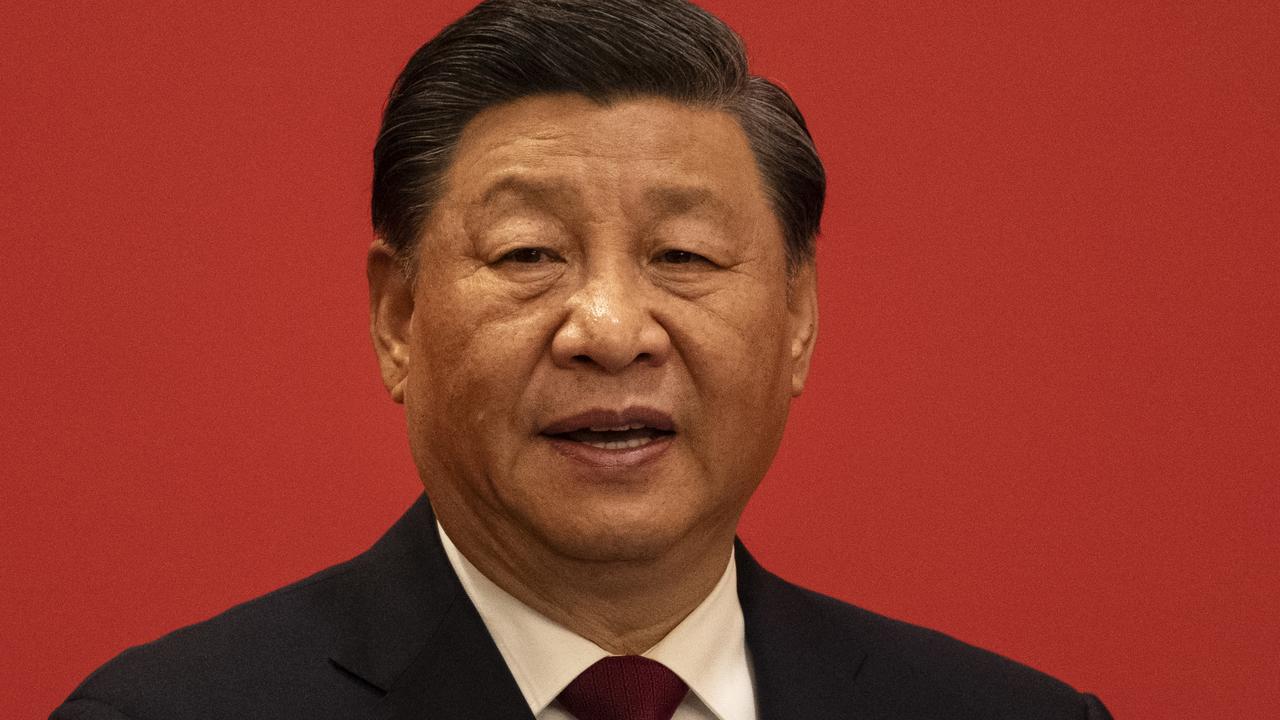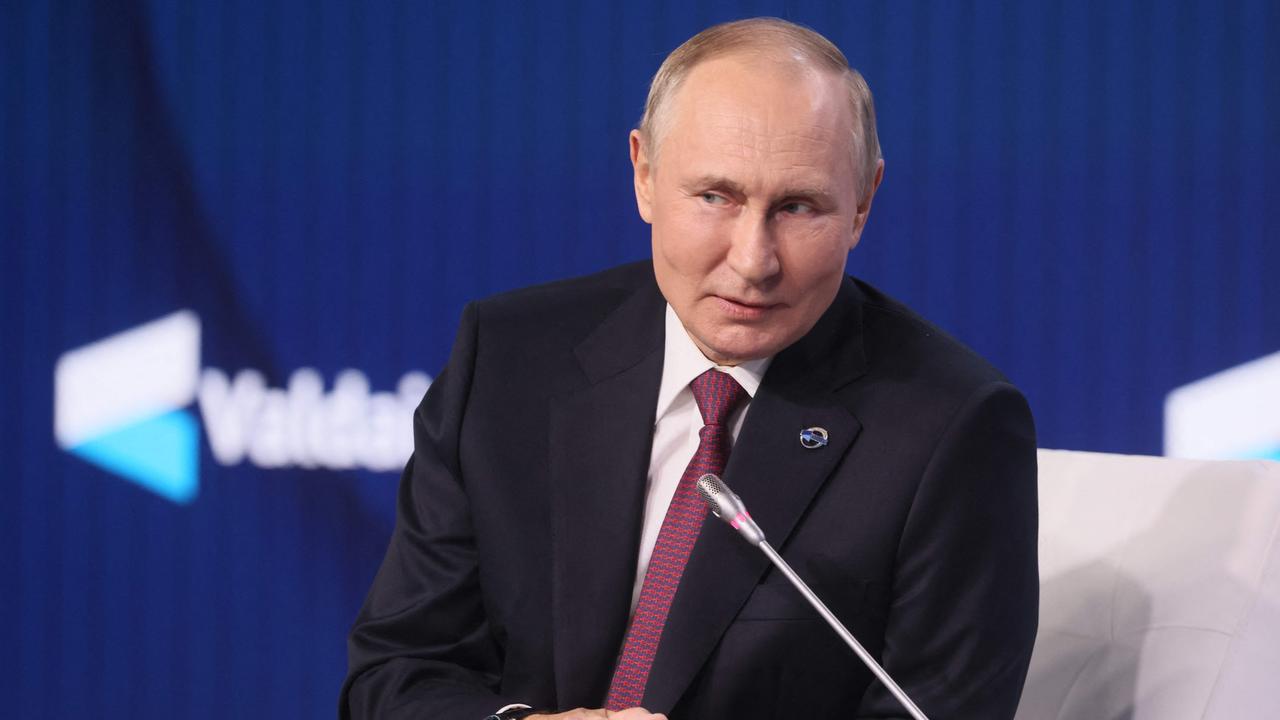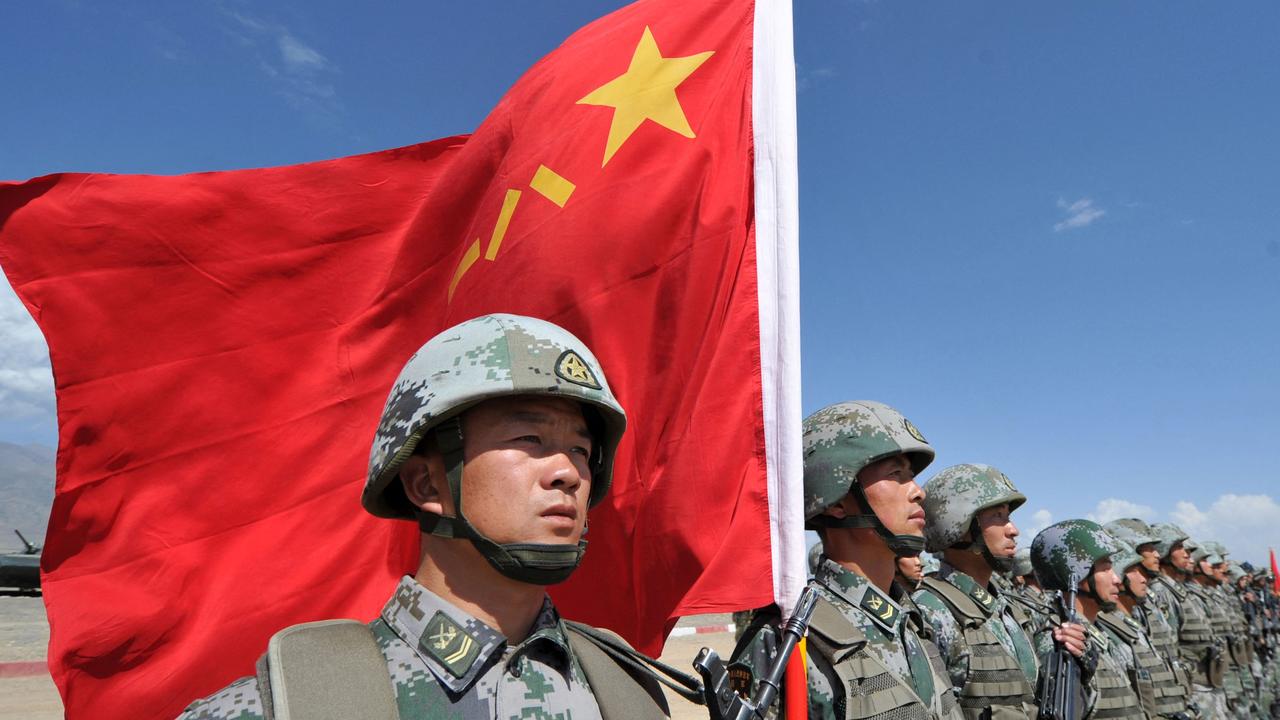Major trap facing Chinese President Xi Jinping as threat of Taiwan war escalates
The threat of war on Australia’s doorstep is escalating – but Chinese President Xi Jinping risks falling into one major “tyrant trap”.
“Grand Navigator” Xi Jinping has vowed to bring the 24 million people of democratic Taiwan under Beijing’s control — by force if necessary.
Under the 10 years of his increasingly authoritarian rule, he’s been working hard to do so.
He repeated that vow as he brushed aside Communist China’s age-limit rule to cement his position as leader for life.
“The wheels of history are rolling on towards China’s reunification and the rejuvenation of the Chinese nation. Complete reunification of our country must be realised,” Xi told the 20th National Congress last week to resounding applause.
He’s made a determined start.
Chinese warships and combat aircraft have probed the borders of Japan, South Korea, Taiwan and the Philippines hundreds of times so far this year. Analysts believe this is a deliberate test of military response times and the resolve of governments to stand against Beijing’s might.
But Xi has a problem.
Are his enormous new navy, modernised air force and retrained army as good as he thinks they are?
Their technology is an evolution of Russian systems. Their ships, tanks and aircraft are developments of Russian designs. Their command and control structure also follows Russian philosophies.

These are now lying shattered on the battlefields of Ukraine. Even the best-equipped combat veterans – a level of skill China doesn’t have – could not resist small forces of well-led, Western-equipped opponents.
It may have given Xi pause for thought.
“Beijing is not in a state of reckless escalation or suicidal,” says University of California professor of global conflict, Tai Ming Cheung.
“To the contrary, Chinese military planners view their own military capabilities with marked caution, and eight months into the war in Ukraine, Russia’s serial failures have amounted to a drawn-out approximation of what a rash or poorly prepared Chinese campaign in Taiwan might look like.”
And yet, Xi appears to have fallen into a tyrant trap.
He can’t be seen to back down. Like his “best friend” Vladimir Putin, he can’t afford to appear weak. So he must escalate to maintain power.
“The PLA may find itself being called into action well before it is combat-ready,” Professor Cheung observes.
The dogs of war
In 2021, the Chinese Communist Party (CCP) changed its plans. It ordered the People’s Liberation Army (PLA) to accelerate its modernisation plans.
Chairman Xi repeated this call in his 20th Congress speech.
He demanded a “quicker elevation of the PLA to world-class standards”. He insisted it must be ready to “win local wars”.
He cut the deadline for this from 2035 to 2027.
“This suggests that PLA leaders are facing a worrying conundrum over the next few years,” writes Professor Cheung.
“The lessons of the Russian war against Ukraine shows that China militarily needs much more time to strengthen and revamp its war-fighting establishment to address the glaring weaknesses and gaps highlighted on the Ukrainian battlefield.”
But Xi’s “wolf warrior” diplomacy risks backing China into a corner.
Seizing Taiwan is no easy task.
It may be just 177km off the coast.
Its 26 million population is a drop in the ocean against China’s 1.4 billion.
But any attempt at invasion will be far more complex than that of Russia crossing a line on a map into Ukraine.
Analysts say it will need hundreds of thousands of soldiers. These would need to be equipped, assembled and deployed in the largest amphibious invasion force to be seen since the D-Day assault on Normandy in World War II.
Chairman Xi has been working towards this goal.
China now has the most warships in the world. Many of them are of the most modern and powerful designs.
Its air force has the best Russian models and a new homegrown stealth fighter. A new stealth bomber is not far off.
Its army has a formidable array of fast, long-range missiles. These put every potential opponent in East Asia at risk.
It’s been a source of national pride. And a stick to back up Beijing’s increasingly forceful rhetoric.
But tens of thousands of Russian troops now lay dead or wounded. Thousands of tanks and fighting vehicles have been wrecked. None of President Putin’s battlefield objectives have been secured.
Russia’s military no longer inspires fear. Instead, Putin faces humiliation and ridicule.
“In Beijing, the conflict in Europe serves not as a green light for China’s military campaign against Taiwan, but as an invaluable opportunity for Chinese war planners to learn about their own battlefield vulnerabilities at some one else’s expense,” says Professor Cheung.
All the Emperor’s men
“Russia’s Ukraine adventure should be inspiring caution among the PLA’s professional war-fighting cadre,” argues Cheung.
“They have seen their closest military ally gamble everything on an elective war of territorial conquest only to end up weaker, less feared, and more isolated than they were before the invasion.”
But Beijing also has cause for encouragement, argues Council on Foreign Relations (CFR) president Richard Haas.
“The war in Ukraine has yielded nothing resembling the nearly universal embrace of the goals and institutions of the US-led order that was spurred by the Gulf War,” he writes.
“Instead, Beijing has aligned itself with Moscow, and much of the world has refused to sign on to the sanctions imposed on Russia by Washington and its partners.”
Xi’s congress “work report” admitted China’s need to “improve the command system for joint operations”.
He also stressed the PLA’s need for “systems and capacity for reconnaissance and early warning, joint strikes, battlefield support, and integrated logistics support.”
But this requires a culture change.

And that’s not what’s happening.
The 20th National Congress last week did what it was designed to do for everyone other than Xi: reshuffle the leadership.
But one other man was granted an exemption from the mandatory retirement age limit.
General Zhang Youxia, 72, served alongside Xi’s father. They were fast friends. And, of China’s top 100 military commanders, he’s the only one with actual combat experience.
He was appointed to the Central Military Commission (CMC).
Xi is its chairman. Four generals and two vice-chairmen make up the remainder.
At least one other new appointee has close personal ties to Xi: General He Weidong served in Fujian province – opposite Taiwan – during Xi’s deployment there.
Like many others in the reshuffle, Xi’s promoted him on the basis of loyalty. Competence came second.
But the stakes of failure are high.
“Chinese leaders fear that if they were to go to war against Taiwan and fail to take the island, this would lead to the downfall of the Communist Party,” says Professor Cheung.
The fish rots from the head
“What is certain is that Xi and other Chinese leaders seem to assume that China will pay little if any cost for its aggressive behaviour, given that others are too dependent on its exports or on access to its market,” warns Mr Haas.
“So far, this assumption has been borne out. Yet a conflict between the United States and China no longer seems like a remote possibility.”
It was the same assumption made by Russia.
And the culture of cronyism and corruption the tyrant built about himself only reinforced this belief.
His generals dared not warn him of weakness. His spies dared not tell him inconvenient truths. His advisers sought favour by piling on praise and false confidence.
Last week, Xi moved to entrench the same scenario among his senior staff.
And that may strip China’s key government institutions of the ability to do their job without fear or favour.

“In Beijing, military planners are likely wondering if the PLA could perform any better than its Russian counterpart against what is in some respects an even harder target than Ukraine – a mountainous and heavily protected island wielding a larger and more advanced arsenal of American and European aircraft and air-defence systems, naval systems, and ground forces,” notes Professor Cheung.
“Perhaps most worryingly from a Chinese perspective, the army currently bogged down in Ukraine is far more battle-tested than China’s, with recent experience in Chechnya, Syria, Georgia, and a range of other contexts.”
Will Xi see this as cause to back down or accelerate his expansionist agenda?
“Beijing is becoming increasingly anxious that its goal of reunification with Taiwan is at growing risk,” Cheung warns.






